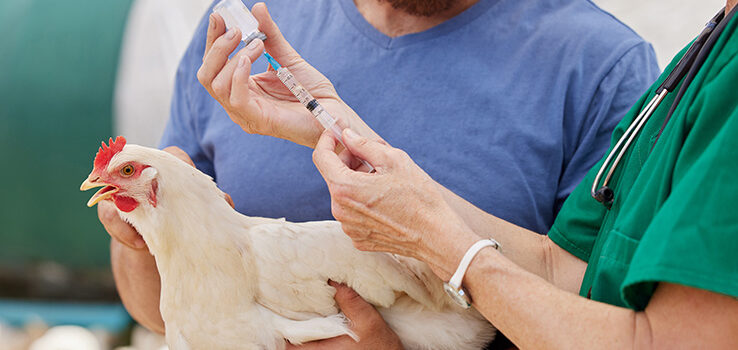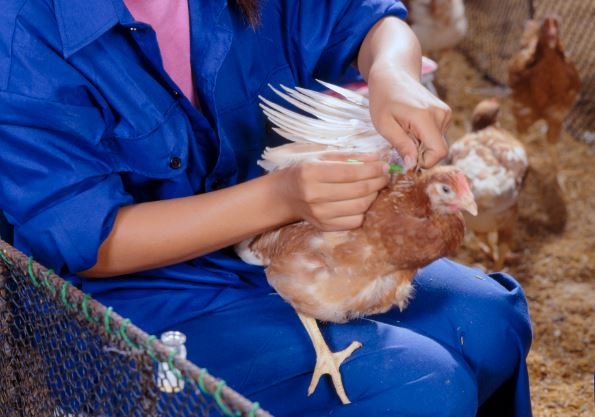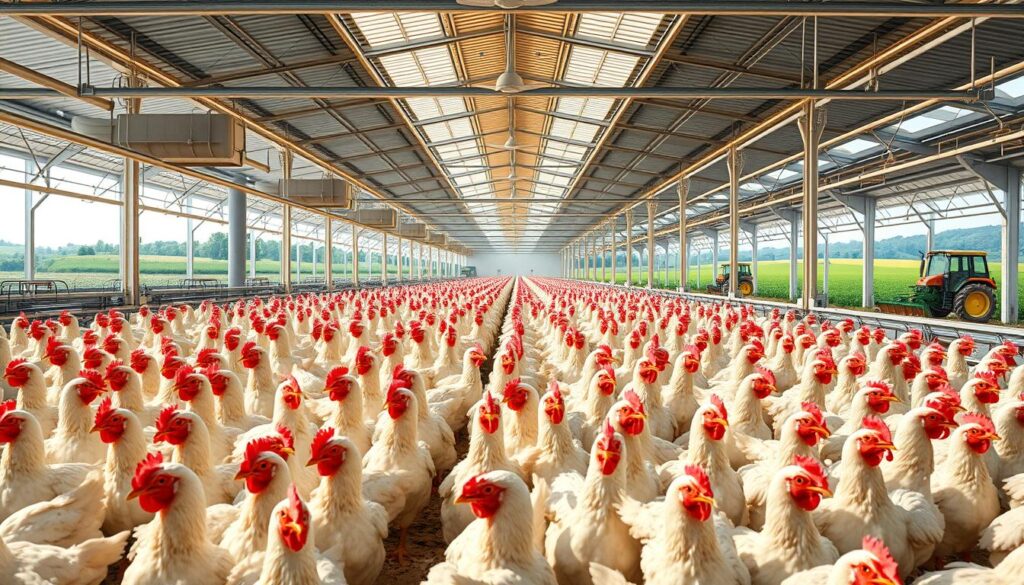
Vaccination is key in keeping poultry healthy and boosting broiler profits. This article looks at the costs and benefits of vaccination in the broiler industry. It helps farmers improve their flock’s health and increase profits.
Key Takeaways
- Vaccination is a big investment in broiler production, with both direct and indirect costs.
- Good vaccination programs stop diseases, keep flocks healthy, and prevent poultry disease prevention.
- Vaccinated broilers grow better and faster, helping farmers make more money.
- Doing a detailed cost-benefit analysis is key to finding the best vaccination plan for broilers.
- Vaccination with other poultry health management strategies like biosecurity and pest control can bring even more benefits.
The Economics of Vaccination: Cost vs. Benefits in Broiler Production
In poultry farming, deciding on vaccination is key. Vaccines help keep broiler flocks healthy and productive. But, the cost can affect profit. It’s important to understand this balance for broiler chicken production.
Vaccination in broiler production has both direct and indirect costs. Direct costs are the vaccine price, labor, and resources needed. Indirect costs include downtime for vaccination, which can hurt production and revenue.
| Vaccination Cost Considerations | Impact on Broiler Production |
|---|---|
Direct Costs:
|
|
Indirect Costs:
|
|
Deciding on vaccination in broiler production is complex. The effects can last a long time. By analyzing costs and benefits, producers can keep their flocks healthy and profitable.
Poultry Farming: A Thriving Industry
The poultry farming industry is booming, with broiler chicken production leading the way. It’s a profitable field that draws in investors and entrepreneurs. Yet, it faces challenges like disease outbreaks, high feed costs, and strict environmental rules.
Broiler Chicken Production: A Lucrative Venture
Broiler chicken farming is a money-maker in the poultry world. The need for cheap, tasty protein drives its growth. This makes it a great choice for both small and big farms.
Its success comes from better breeding, feeding, and housing. People also prefer chicken more than other meats. Plus, it meets the world’s growing need for poultry.
Challenges in Broiler Production
- Disease Outbreaks: Broiler farms must watch out for diseases. These can harm the health and productivity of the chickens.
- Feed Costs: The price of feed, like grains and soybean meal, can hurt profits.
- Environmental Regulations: Farms must follow strict environmental rules. This can raise costs and change how they operate.
To keep broiler farming profitable, farms need strong health plans. This includes good vaccination programs. It’s key for the industry’s future success.
Vaccination: A Crucial Investment
In the world of broiler production, vaccination is key. It’s not just a cost; it’s a smart move. Vaccination helps keep flocks healthy and productive.
Vaccination is a big part of keeping broilers safe. It fights off diseases like Newcastle disease, infectious bronchitis, and avian influenza. Vaccines help birds fight off sicknesses better.
- Vaccination lowers disease risk, saving money and keeping production up.
- Healthy birds grow faster and use less food, improving farm efficiency.
- It also keeps the farm safe, helping it stay profitable over time.
Vaccination is a must in modern broiler farming. It keeps flocks healthy, helping farms thrive. This ensures a strong poultry industry.
“Vaccination is not just a cost, but a strategic investment in the long-term success of broiler production. It’s a critical component of comprehensive poultry health management.”
Assessing Vaccination Costs
Vaccination is key for poultry farmers to stay profitable. It’s vital to know the costs involved. Both direct and indirect costs need to be considered.
Direct Costs: Vaccines and Administration
The main direct costs are the vaccine prices and the cost of giving them. The price of vaccines varies by type and amount needed. Labor and equipment, like syringes and disinfectants, also add to these costs.
Indirect Costs: Labor and Downtime
Indirect costs include labor and any lost time during vaccination. Any delay in production can cut into profits. This affects the farm’s overall success.
| Cost Type | Example Expenses |
|---|---|
| Direct Costs |
|
| Indirect Costs |
|
Understanding both direct and indirect costs helps farmers make better vaccination plans. This way, they can improve their poultry production.

Evaluating Vaccination Benefits
Vaccination in broiler production offers many benefits beyond the initial cost. It prevents deadly diseases and keeps flocks healthy. This boosts productivity and growth rates.
Disease Prevention and Flock Health
Vaccination protects poultry from many infectious diseases. It reduces the risk of outbreaks and saves money. Healthy, vaccinated birds grow stronger and have lower death rates.
Improved Productivity and Growth Rates
Vaccination also boosts productivity and growth in broiler chickens. Healthy birds grow faster and more efficiently. This means higher yields and better profits for farmers.
| Vaccination Benefits | Impact on Broiler Production |
|---|---|
| Disease Prevention | Reduced mortality, improved flock health |
| Flock Health Maintenance | Lower susceptibility to illnesses, stronger immune response |
| Improved Productivity | Enhanced feed conversion, faster growth rates |
| Increased Growth Rates | Higher yields, better feed efficiency, greater profitability |
By understanding vaccination benefits, farmers can improve their flocks’ health and productivity. This leads to more profitable and sustainable operations.
“Vaccination is a vital component of comprehensive poultry health management, providing a robust defense against disease and unlocking the full potential of broiler production.”
Economic Analysis: Cost-Benefit Ratio
Understanding the economic impact of vaccination in poultry farming is key to making more money. A detailed economic analysis helps farmers make smart choices about vaccinations. By looking at the cost-benefit ratio, farmers can see if their vaccination programs are worth it.
Many factors are considered in this analysis. Costs like vaccine prices and labor are weighed against benefits like better health and more productivity. This way, farmers get a full picture of how vaccination affects their finances.
| Metric | Description | Impact on Cost-Benefit Ratio |
|---|---|---|
| Return on Investment (ROI) | Measures the financial gain from vaccination in relation to the investment | Higher ROI indicates a more favorable cost-benefit ratio |
| Benefit-Cost Ratio (BCR) | Compares the monetary benefits of vaccination to the associated costs | BCR greater than 1 suggests a positive cost-benefit ratio |
| Net Present Value (NPV) | Calculates the present value of the net benefits from vaccination | Positive NPV indicates a favorable cost-benefit ratio |
By studying these metrics, poultry farmers can choose the best vaccination strategies. This approach helps them get the most out of their broiler production efforts. It makes sure vaccination is a smart and profitable choice for their poultry farming business.

Poultry Health Management Strategies
Keeping broiler flocks healthy is key to making money in poultry farming. It’s not just about vaccines. Important parts include biosecurity measures and integrated pest management (IPM).
Biosecurity Measures
Good biosecurity stops diseases from getting into a farm. Important steps include:
- Limiting who gets into the farm and checking visitors
- Cleaning vehicles, equipment, and people before they enter
- Getting rid of dead birds and waste to stop disease spread
- Controlling pests and rodents to stop disease carriers
- Keeping different ages and stages separate to avoid mixing diseases
Integrated Pest Management
Integrated Pest Management (IPM) is a smart way to fight pests without too many chemicals. It uses:
- Cultural practices: Keeping places clean and well-ventilated, managing manure, and choosing pest-resistant birds
- Biological control: Using natural enemies to fight pests
- Mechanical control: Using traps and screens to keep pests out
- Chemical control: Using pesticides only when really needed
With a strong poultry health management plan, farmers can lower disease risks. This makes their farms more productive and profitable.
Maximizing Broiler Profitability
The secret to lasting success in broiler farming is making more money. By using vaccinations wisely, farmers can improve their business. Looking at the costs and benefits of vaccination is key to this success.
Adding vaccination to a strong health plan helps a lot. This plan includes keeping the farm clean and controlling pests. It keeps the birds healthy and makes the farm more efficient. This means more money for the farmer.
By understanding the value of vaccination, farmers can make smart choices. This helps them stay ahead in the competitive broiler market. It’s all about finding the right balance to make the most profit.